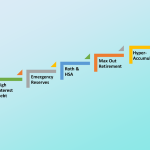(Guest article by Elena Stewart)
Building a secure financial future extends beyond mere savings; it involves making informed decisions that evolve with your life’s phases. Each choice, from how you manage daily expenses to investing in your education, crucially moulds your financial outlook. By strategically crafting a plan that both sustains and enhances your economic situation, you set a foundation for prosperity. This approach ensures that every financial decision contributes positively to a robust financial structure, geared towards long-term wealth and stability. Learn essential strategies for crafting a sustainable financial future in this article!

Key takeaways
- Building a secure financial future involves making informed decisions that adapt with your life’s phases.
- Investing in education enhances earning potential and broadens career opportunities.
- Creating and maintaining a precise budget is essential for controlling spending, saving more, and avoiding debt.
- Automating savings ensures consistent contributions toward future financial needs and builds financial discipline.
- Planning for major life events with foresight and preparation helps avoid high-interest debt and enhances financial resilience.
- Maximizing retirement contributions through employer-sponsored plans or personal accounts secures financial future and offers tax benefits.
- Establishing an emergency fund to cover unexpected expenses protects financial stability and provides peace of mind.
- A proactive approach with strategic planning is crucial for long-term financial resilience and security.
Invest in knowledge and opportunities
Investing in your education is a crucial step toward financial prosperity. By pursuing higher education, you unlock better-earning potential and broaden your career opportunities.
This investment goes beyond just attending college; it includes acquiring certifications, attending workshops, and participating in seminars that enhance your skills and marketability.
Each educational milestone you achieve adds a layer of financial security and adaptability in a rapidly evolving economy.
Engaging in continuous learning keeps you well-prepared for economic shifts, ensuring long-term growth and stability.
Budgeting basics
Learning to budget is essential for managing your financial health effectively. Creating a precise budget helps control spending, save more, and avoid debt.
Utilize free online templates to set up your monthly household budget, selecting from various styles to find one that suits your lifestyle perfectly. If you’re seeking tools to enhance your financial management, check it out.
Regularly updating your budget to reflect your current financial situation is crucial, as it ensures you maintain continued control over your finances.
Seamless saving strategies
Automating your savings ensures that you consistently set aside a portion of your income for future needs, seamlessly integrating savings into your financial routine.
By establishing automatic transfers to your savings account, you prioritize your future financial needs over immediate desires, paving the way for accumulated wealth and enhanced security over time.
Automation helps build discipline in financial practices by removing the temptation to overspend, ensuring a steady growth of your financial reserves.
Preparing for big changes
Planning for major life events, such as buying a home or starting a family, requires foresight and financial preparation.
By setting aside funds specifically for these significant expenses, you can avoid the common pitfalls of last-minute financing or, worse, incurring high-interest debt. This proactive approach ensures you’re ready for important milestones without jeopardizing your financial stability.
Early planning also positions you to capitalize on financial opportunities as they arise, enhancing your ability to manage expenses more effectively and maintain economic resilience.
Enhance your retirement savings
To ensure a comfortable retirement, it’s crucial to maximize your retirement contributions. Make the most of employer-sponsored retirement plans or personal retirement accounts.
Even small, incremental increases to your contributions can greatly enhance your retirement fund due to the power of compound interest and tax deferrals.
This strategic move not only secures your financial future but also lowers your current taxable income, offering immediate financial benefits and long-term security.
Fund your safety net
An emergency fund is your financial safety net designed to cover unexpected expenses such as medical emergencies or sudden job loss. Aim to save at least three to six months’ worth of living expenses.
Having this fund in place protects you from financial strain and provides peace of mind during unforeseen circumstances.
This buffer allows you to handle emergencies without disrupting your financial goals or incurring debt, ensuring you stay on track with your long-term financial plans.
Final thoughts
Embarking on the journey to financial health is a proactive process that requires dedication and strategic planning. By focusing on these fundamental strategies, you equip yourself with the tools necessary for long-term financial resilience and security.
Remember, the path to financial freedom starts with a commitment to making informed choices and taking calculated risks.
Your financial plan is a living framework that should evolve as your needs change, adapting to provide the best outcomes for your personal and financial growth.
Investing in education enhances your earning potential and broadens career opportunities, providing long-term financial security and adaptability in a rapidly evolving economy.
FAQs
1. Why is investing in education important for financial prosperity?
Investing in education enhances your earning potential and broadens career opportunities. It includes attending college, acquiring certifications, attending workshops, and participating in seminars to improve skills and marketability. Continuous learning ensures you are well-prepared for economic shifts, contributing to long-term financial stability.
2. How can creating a budget help manage financial health?
Creating a precise budget helps control spending, save more, and avoid debt. Regularly updating your budget to reflect your current financial situation ensures you maintain control over your finances. Using free online templates can simplify setting up a monthly household budget that suits your lifestyle.
3. What are the benefits of automating savings?
Automating savings ensures that you consistently set aside a portion of your income for future needs, integrating savings seamlessly into your financial routine. This practice builds discipline in financial habits by removing the temptation to overspend, resulting in steady growth of financial reserves and enhanced security over time.
4. How should I prepare financially for major life events?
Preparing for major life events, such as buying a home or starting a family, requires foresight and financial planning. Setting aside funds specifically for these significant expenses helps avoid last-minute financing or high-interest debt, ensuring readiness for important milestones without jeopardizing financial stability.
5. What strategies can enhance my retirement savings?
Maximizing retirement contributions through employer-sponsored retirement plans or personal retirement accounts is crucial. Even small, incremental increases to contributions can significantly enhance your retirement fund due to compound interest and tax deferrals. This strategy secures your financial future and lowers current taxable income.
6. Why is having an emergency fund important?
An emergency fund acts as a financial safety net to cover unexpected expenses such as medical emergencies or sudden job loss. Saving at least three to six months’ worth of living expenses protects you from financial strain and provides peace of mind during unforeseen circumstances, ensuring you stay on track with your long-term financial plans.
7. What is the importance of a proactive approach to financial health?
Embarking on the journey to financial health requires dedication and strategic planning. By focusing on fundamental strategies, you equip yourself with the tools necessary for long-term financial resilience and security. A proactive approach involves making informed choices and taking calculated risks, with a financial plan that evolves to meet changing needs.
Image attribution: Freepik





